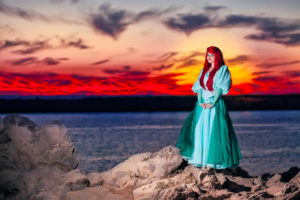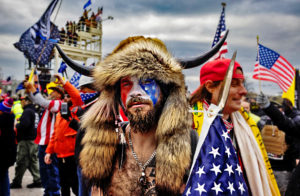Fifteen years ago, in a world rattled by economic turmoil and facing impending recession, one of the most influential phenomena of our time emerged — an issue that would dominate the discourse, capture the intellect, and shape the political destinies of an entire generation. I am talking, of course, about the question: Team Edward or Team Jacob?
November 2008 marked the theatrical release of Twilight, the first film adaptation of the romance novels that centred on a love triangle between a vampire, a werewolf, and a teenage girl. By this point, they had already become a transformative force in the book world — but this was only the beginning.
Within a year, you couldn’t swing a cat without hitting something Twilight-themed. There was a Twilight-themed makeup palette, and Immortal Twilight perfume to dab on your pulse points. You could drink your coffee from a Team Edward mug in the morning, roll up to the Burger King drive-thru in Edward Cullen’s Volvo C30, order a Twilight-themed kids’ meal for lunch, then go home and curl up in the arms of your Edward body pillow beneath your precise replica of Bella’s purple duvet. The franchise’s rabid fanbase was a market force unto itself: brand something as a Twilight tie-in, and they’d snap it up.
These fans weren’t just a reliable income stream, though: they were a powerful, even political, faction that was not to be trifled with. I was a reporter on the Young Hollywood beat for MTV News at the height of the Twilight craze, and so great was their cultural power that an editorial edict instructed we refrain from calling them “Twihards”, because they didn’t like it.
At first, Twilight‘s cultural influence was chalked up to its popularity among adolescent girls. Edward and Bella’s romance was a love story, but also an obvious abstinence parable, making it a perfect vehicle for teens to explore the burgeoning passions for which they otherwise had no words. This, at least, was not surprising: every generation has something that both captures the imagination and inspires the lust of a young female audience. I was too old to be swept up in the Edward Cullen craze, but just the right age to spend long hours earnestly debating with my friends which of the Teenage Mutant Ninja Turtles would make the best boyfriend. (Raphael, obviously.)
But the way Twilight captured the broader discourse was more unusual, which had as much to do with timing as with the story itself. Twilight dropped directly into the midst of a digital revolution that catapulted fandom from niche communities to a global, quasi-political force. The iPhone, Goodreads and Tumblr all debuted in 2007; when Twilight the movie was released a year later, it was the spark in an armoury already filled with 10 different types of ammunition.
The resulting explosion wasn’t just in consumption: fans were curating mood boards, making memes, writing their own fanfics, and engaging in direct conversations with creators courtesy of social media. Stephenie Meyer might have written Twilight, the book, but the ever-expanding universe in which it existed? That belonged to the fans — who increasingly felt a sense of entitlement, control, even ownership over the stories, the characters, and the culture they loved.
For this, we may credit Twilight‘s ageing fanbase, who rather than discarding fandom in favour of more grownup concerns ended up simply carrying it with them into the adult world. For teenage girls, the Edward vs Jacob debate offered a way to explore romantic relationships — who you liked and what you wanted — within the safe framework of fiction. But for adult women, Twilight was more than an excuse to be horny on main; it was a framework for discussing literally anything, from race to religion, to romantic mores, to decolonisation. Was Bella a victim of Stockholm Syndrome, or a feminist icon who persisted in chasing what she wanted at all costs? Was Jacob cruelly and undeservedly friend-zoned, or was he a total incel? Was Twilight racist because the vampires were pale — or should it be celebrated for representing Native American characters? Then there was the question of the age gap between Edward and Bella: you say immortal teenage dreamboat; I say creepy 108-year-old man.
All this was happening against the backdrop of a collapse in the distinction between teen and adult content in publishing and entertainment: 2008 was the era of Peak YA. As many not-so-young adults suddenly discovered a passion for content aimed at teenagers, bookstores were overwhelmed by “chosen one” stories, in which a heroine who doesn’t know how beautiful she is has to fight the forces of evil — while caught in a love triangle between two equally strapping suitors. For decades, this type of content had been written off as frivolous, a passing fancy; now, its power could not be denied. Twilight was perhaps the first property to make clear that, in the digital age, young women’s passions are not to be taken lightly.
Twilight itself has now faded from view, but its influence lives on; it taught us to see absolutely everything as a question of teams. It wasn’t just the Edward-or-Jacob debate, which would always be a sort of friendly rivalry owing to its predetermined resolution (you could make a good enough case for Jacob, but Bella was never going to end up with him). It was the Twilight fandom itself, and what it became for its adherents. Loving Twilight was a cause, a chance to be part of something bigger than yourself — as was hating Twilight, if that was your thing, for whatever evils you felt it represented.
And by the time the final film in the series was released — one week after Barack Obama’s successful re-election to the presidency — American culture at large was beginning to look a lot like American politics: a highly polarised world of in-groups and out-groups, where the rivalries weren’t so friendly anymore. At the same time, a new mode of cultural critique had arrived in the form of Your Fave Is Problematic, a witch-hunting Tumblr that indicted celebrities and content creators (and by extension, their fans) for various sins against social justice. The whole thing was a guilt-by-association machine. If an admired creator was called out for some -ism or -phobia, you had two choices: denounce the sin and renounce your fandom, or be tarred as complicit.
In this moment, the cult of fandom and the culture of consumption fully collided to create something monstrous — but also, something deeply compelling. If art and politics were inextricable — as both Tumblr users and mainstream culture critics now reliably assured us they were — then so was fandom and activism. Fandom mattered. Fans mattered. And whatever you were into, it was more than mere interest; it was your identity. In this world, what you like is who you are.
And in a world where fandom had become political, it was only a matter of time before politics became fandom: tribal, facile, and tailor made for our current moment. As a mode of engagement, fandom neither rewards nor leaves room for nuance; the whole point is that it’s obvious which team you should be on, which makes it the ideal medium for a political culture that thrives on simple sloganeering, Instagram-sized infographics, and 60-second TikTok explainer videos. Fandom is what fuels the blonde college student in a keffiyeh, rolling her eyes as she explains that once Israel has ceased to exist, the Jews who lived there can simply return to wherever they came from — like Yemen, or Ethiopia. It fuels, too, the pro-Israel activist who thrusts a camera in her face, knowing she’ll beclown herself.
It’s not just the tribalism but the blazing certainty — that there’s a right side, and that identifying it is both uncomplicated and fun. For people coming of age on social media, Twilight offered the first inkling of how good being part of a mob could feel. How wonderful to just pick a side and root for it: fiercely, loyally, unconditionally and absolutely. And once you had done this with sparkly vampires, it was surprisingly easy to do it with everything else.
Disclaimer
Some of the posts we share are controversial and we do not necessarily agree with them in the whole extend. Sometimes we agree with the content or part of it but we do not agree with the narration or language. Nevertheless we find them somehow interesting, valuable and/or informative or we share them, because we strongly believe in freedom of speech, free press and journalism. We strongly encourage you to have a critical approach to all the content, do your own research and analysis to build your own opinion.
We would be glad to have your feedback.
Source: UnHerd Read the original article here: https://unherd.com/





